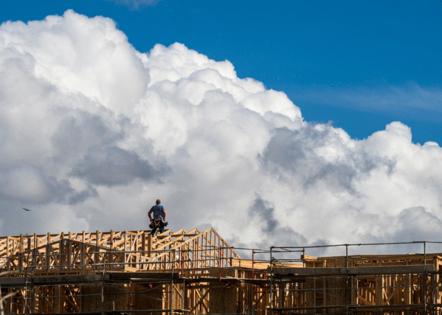Commentary: 50-year mortgages won't fix the affordability crisis
Published in Op Eds
Bill Pulte, director of the Federal Housing Finance Agency, recently floated the idea of offering people a 50-year mortgage instead of the more conventional 30-year financing option. It sounds attractive at first because stretching out repaying of a mortgage would lower the borrower’s monthly payment, but this wouldn’t fix the homeownership affordability crisis.
It’s no exaggeration to name the current situation as a crisis. According to the Federal Reserve Bank of Atlanta, the percentage of a household’s income needed to afford just a median price home is near a record high today, and affordability is near a record low. An entire generation of young Americans has largely given up on the dream of homeownership.
The profligate spending of the Biden administration and the monetary mismanagement of the Federal Reserve caused both home prices and interest rates to skyrocket, a deadly one-two punch that knocked out the housing market.
Because home prices and interest rates are the primary factors in determining a potential buyer’s monthly mortgage payment, when those two inputs quickly rose, Americans saw the monthly mortgage payment on a median price home more than double in less than four years.
If that’s not an affordability crisis, nothing is.
Further exacerbating the problem is the fact that millions of Americans bought a home or refinanced in 2020 and 2021 at abnormally low interest rates and effectively cannot sell their homes in today’s market of relatively high interest rates.
The reason for this phenomenon is that the seller almost always must pay off the existing mortgage on a home at the time of sale, ending that mortgage. The remaining proceeds are then used for a down payment on another home, but the new mortgage won’t be another loan at 3 percent or less, but typically 6% or more.
The seller must be content with moving into a much less expensive home, otherwise the monthly mortgage payment will explode. Consequently, homeowners today are listing their houses for exorbitant prices just to try and manage the financing costs on their next home.
The market for new homes is no better, where homebuilders face record costs which they have been forced to pass on to consumers to prevent losses. Even still, starter homes and more economical options aren’t profitable at all in certain markets, so homebuilders increasingly are building just luxury homes instead.
In response to America’s frozen housing market, many commentators have been clamoring for the Federal Reserve to cut interest rates, thereby reducing financing costs for potential homebuyers to theoretically increase affordability.
Unfortunately, interest rates and home prices have largely recoupled today, meaning they’ve returned to their traditional inverse relationship. When interest rates fall, people can borrow more money and maintain the same monthly mortgage payment. That means borrowers can take larger mortgages and bid up the price of homes, leaving affordability unchanged.
That’s a fatal flaw with the 50-year mortgage as well. It will incentivize would-be homeowners to borrow more than they should while putting upward pressure on home prices.
Meanwhile, the borrower is effectively a renter, at least for the first decade or so of the mortgage because almost none of the monthly mortgage payment will go to principal, reducing the amount owed to the bank. The homeowner will be building virtually no equity at all during that time, much like a renter.
Worse, the median age of a first-time homebuyer is now 40 years old. Even in the unlikely scenario where the introduction of 50-year mortgages reduces that age, perhaps to 35, homeowners still wouldn’t truly own their homes even well into retirement, so they may never be able to retire to continue making mortgage payments.
While the proposed 50-year mortgage may come from a sincere desire to help Americans struggle to find affordable housing, it wouldn’t solve the problem. Indeed, housing isn’t unaffordable because of a dearth of long-term financing options but because of a fundamental mismatch between supply and demand.
When the Biden administration flooded the country with over 10 million illegal aliens, that significantly increased the demand for housing. Simultaneously, failed fiscal and monetary policy directed capital away from private industries, like housing, which reduced output. Years of overregulation, from the local to the federal level, further reduced the supply of homes.
This is Econ 101: Increasing demand while decreasing supply is a textbook way to drive up prices. If we truly want to solve the homeownership affordability crisis, then we must address the root causes of the supply and demand mismatch that exists today—not introduce novel financing mechanisms that are ancillary to the real problem.
_____
E.J. Antoni, Ph.D., is chief economist and the Richard Aster fellow at the Heritage Foundation, and a senior fellow at Unleash Prosperity.
_____
©2025 Tribune Content Agency, LLC.
























































Comments